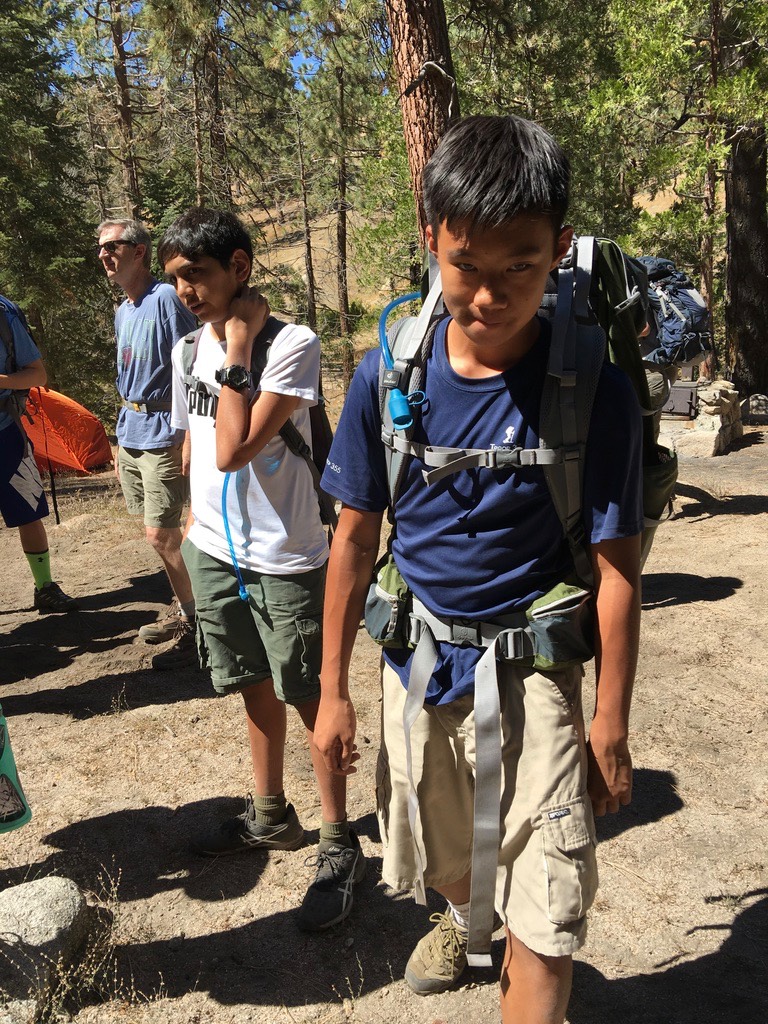
W (right) and some of the senior scouts readying for their water sherpa hike.


J (right) and three patrol mates, waiting for the non-water-sherpa hike.

Resting during the easy afternoon hike.
Just over two weeks ago, on the weekend, W, J, and I went with their Boy Scout troop on a backpacking trip to Cooper Canyon in the San Gabriel Mountains — ~6000 ft elevation, net elevation change of 250 ft, and about 2.5 miles each way. It’s the same first backpacking trip I made with W three years ago, and it’s J’s first backpacking trip as well. I went as Assistant Scoutmaster for J’s patrol.
As usual for me, it was exhausting, particularly the hike back on Sunday morning. I spent both hikes into and out of Cooper Canyon occasionally yelling at the senior scouts leading the hike (including W) to keep the pace slower not just for me — a middle-aged old man — but also for the younger, new scouts who aren’t as fit as they are. There was one scout in particular, plus his dad, who had a very, very hard time hiking in both directions.
Kelly, the Scoutmaster, had hiked to the campground along with his older son the weekend before to find that the stream by the campground, which had provided us with water three years ago, was dry, due to the drought. So, the plan was that instead of the two liters we usually backpack in, we’d each carry 3-4 liters in. When packing, I had been so proud that my backpack, packed, weighed only 20 pounds, but then I added my water supply and brought it over 28 pounds.
The plan, which was well executed, was that we’d all hike in and set up camp, and then 11 senior scouts and a couple of dads would hike back up another trail with their backpacks empty. W and his fellow patrolmates, plus a few others, would be the “water sherpas.” At the other parking lot about 1.5 miles from the campground, they’d get to the car of one of the other adult leaders and find a lot of Platypus (TM) bladders full of water, which they’d carry in their backpacks back to the campground for cooking, for our water supplies on the hike back out, and a little washing.
In the end, all that water was much more than we needed, and we ended up dumping a lot of it the next day in order to lighten our loads, so we’d carry only about 2 liters each on the hike back. Still, better too much water than too little.
Separate from the water sherpas, I and a few other experienced dads led the remaining scouts on another hike along a trail that had some very nice views, leaving camp with the water sherpas but then looping back along another trail.
Later that day and evening, W and his fellow senior patrolmates helped teach scout skills to two of the newer scouts who hadn’t been to Camp Cherry Valley, getting both of them to the Scout rank (a new, entry-level rank). Kelly was very pleased with their work.
Before the hike back, we had a group picture. W and J are lower left, and I’m center rear (in the red Stanford hat and green shirt).
Root beers at the end.
At the end of the backpacking trip, on Sunday morning in the parking lot, we celebrated with cans of cold root beer. Afterward, a bunch of us met at a Habit Burger back at civilization.
——
In recognition of his service to the patrol, not just at Camp Cherry Valley but also at many other times (including Cooper Canyon), W was named as one of the assistant SENIOR patrol leaders of the troop for the six month Fall term. There were 14 applicants for the job, and two more from W’s patrol also were named ASPLs, along with two more deserving scouts from outside of their patrol.
J was named patrol leader for his patrol. He was the only member of his patrol to ask for the job, though. It’s traditional that a new patrol has as its first patrol leader the son of one of the assistant scoutmasters, so the dad can help with meal planning until the scouts learn how to do it without help. One of the other scout’s dads — in fact, one of my fellow assistant scoutmasters — asked for the job on behalf of his son, but that’s a Cub Scout move. In Boy Scouts, the scouts themselves have to ask the scoutmaster for the leadership positions they want.